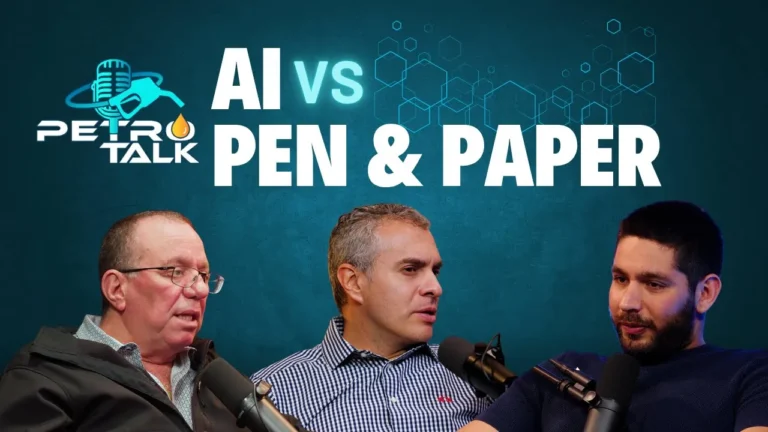AI's Impact on the Fuel Industry
Episode 8 | AI's Impact on the Fuel Industry
In today’s dynamic industries, where every drop of fuel counts, the ability to efficiently manage fuel can be the make-or-break point for operational success. PetroTalk Episode 8 dives deep into how Artificial Intelligence (AI) is transforming the fuel industry, offering cutting-edge solutions to optimize operations, drive efficiency, and significantly reduce costs. Featuring insights from experts like Diego Rodriguez and Tal Ezra, this episode explores the intricacies of AI implementation and its profound impact on fuel logistics.
The Core of AI in Fuel Management: Data and Learning
At its heart, Artificial Intelligence in fuel management begins with data. As discussed in PetroTalk, AI encompasses various subjects, starting with data management and data science. The foundational step is effectively managing data, which then leads into machine learning. Machine learning involves taking “data lakes” – vast reservoirs of information – and applying decision models to analyze problems and find solutions. The primary goal is to leverage machines to assist in thinking, learning, and offering solutions that humans might not even consider, especially in the complex fuel industry.
The accuracy of these AI decision models is heavily dependent on the quality of the data collected, with up to 80% accuracy stemming from robust data. These learning models continuously improve the system, enabling better processes and more informed predictions for future decisions.
From Data Lake to “Data Lake Genius”
A powerful concept highlighted is transforming a simple “data lake” into a “data lake genius”. This involves a sophisticated process where AI collects and analyzes data from numerous sources through APIs, web services, and data analysis. Imagine a fuel tank in your yard: the AI can monitor its level, compare consumption patterns across individual customers, then within the same company, between different companies, and even account for variables like location, weather, and load of operation.
This deep analysis allows AI to go beyond mere statistics, combining various data points to improve every aspect of an operation, reduce effort, and increase productivity.
Predictive Power and Automated Logistics
One of AI’s most significant contributions is its predictive capability. By monitoring factors like “days-before-empty” and “burn rates,” AI can accurately predict future fuel needs and optimize delivery schedules, preventing costly run-outs and keeping operations moving. The system can even suggest the best time to purchase fuel and potentially lock in prices by leveraging its integrated data.
Furthermore, AI-powered systems can simplify fuel reconciliation by cross-checking Bill of Ladings (BOL) with tank levels and comparing inventory against dispensed fuel, ensuring accuracy and transparency.
For complex fuel logistics, AI automates critical processes:
Route Planning: The system can build optimal delivery routes, considering profitability and preventing errors like fuel mixing.
Driver and Vehicle Management: It can ensure qualified drivers are operating trucks, log their activity, track their routes, and monitor deliveries at each stop.
Preventing Misuse: By tracking mileage, engine hours, and ensuring fuel is dispensed only as needed per trip, AI helps prevent fuel leaks and unauthorized usage.
This level of automation provides best practice recommendations and solutions with minimal human involvement, yet empowers human decision-makers.
The Human Element: Empowerment, Not Replacement
While AI brings unprecedented speed and accuracy to data analysis, it’s crucial to understand its role relative to human capabilities. As discussed, humans can perform similar analyses, but AI does it faster and cheaper, drastically improving efficiency. The effectiveness of AI, however, depends on the quality of data it’s fed and how well its models are trained.
Critically, the purpose of AI in the fuel industry is not to replace people but to empower them. It transforms roles, shifting individuals from data entry tasks to overseeing and leveraging the insights provided by the machines.
Overcoming Implementation Challenges
Implementing AI involves unique challenges. A key hurdle is making advanced technology accessible and understandable to people. Additionally, the technology must be effectively applied to solve specific industry challenges. Finding and retaining talented individuals in software development, AI, and machine learning is also a significant challenge.
For companies like SCI, the value lies in offering a holistic, unified solution. Instead of managing multiple disparate systems for level management, fuel dispensing, and fuel delivery, SCI integrates these into a single platform like FuelB4®, ensuring seamless data flow and comprehensive oversight. This unified approach combats the common issue of businesses resorting to manual Excel management due to fragmented technological solutions.
SCI positions itself as a committed technology partner, focusing on continuous development and delivering reliable, secure, and innovative solutions tailored to unique business needs. They emphasize not just providing a product, but serving as a support team and partner for their clients’ technological transformation.
Ready to Optimize Your Fuel Operations?
The future of fuel management is undoubtedly data-driven and automated. If your company is ready to embrace this evolution and achieve similar results in fuel savings, enhanced accuracy, and operational improvements, consider exploring how AI can transform your business.
Curious to learn more about how AI can power up your fuel management and productivity?
Listen to the full discussion on PetroTalk Episode 8 to gain deeper insights into this cutting-edge technology and its applications!
If you enjoyed this episode, make sure to like, subscribe, and turn on notifications for more insightful discussions on Petro Talk. To learn more about how SCI’s innovative fuel management solutions can benefit your business, explore our solutions and book a free consultation with SCI Global LLC, Fuel Management experts.
Our Guest this Episode

Jeremiah Burak
Jeremiah Burak is the Product Development Manager for AFD Petroleum LTD, he has been working closely with SCI to tailor a solution for AFD internal and external customers. With a background in hardware and automation in the oil and gas drilling industry, reliability and ease of use is in the forefront of his mind. His goal is to create a better way to dispense and track fuel, from the refinery to assets; the ability to track every drop provides a measurable advantage and edge in the market. As SCI's tagline states, "Every drop counts".
Latest Episodes
AI’s Impact on the Fuel Industry
Revolutionizing Fuel Management with SCI Global
Contact us
Get in touch with us
Office
300 S. Madison
Ave #2, Clearwater, FL 33756
Contact
SCI Global, LLC | Petro Talk © 2024. All Rights Reserved. Privacy Policy.







